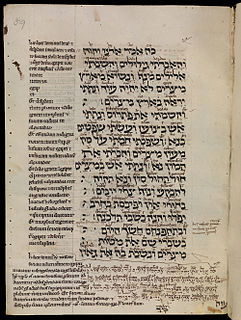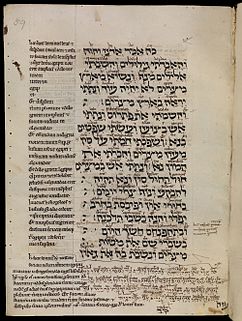
Ezekiel 37 is the thirty-seventh chapter of the Book of Ezekiel in the Hebrew Bible or the Old Testament of the Christian Bible. This book contains the prophecies attributed to the prophet/priest Ezekiel, and is one of the Nevi'im (Prophets). This chapter contains a vision of the resurrection of dry bones, widely known as the Vision of the Valley of Dry Bones, in which Ezekiel at last assures the captives in Babylon that they will return from exile.

Ezekiel 26 is the twenty-sixth chapter of the Book of Ezekiel in the Hebrew Bible or the Old Testament of the Christian Bible. This book contains the prophecies attributed to the prophet/priest Ezekiel, and is one of the Books of the Prophets.

Ezekiel 9 is the ninth chapter of the Book of Ezekiel in the Hebrew Bible or the Old Testament of the Christian Bible. This book contains the prophecies attributed to the prophet/priest Ezekiel, and is one of the Books of the Prophets. This chapter, sub-titled "The Wicked Are Slain" in the New King James Version, contains God's "judgment on the idolaters" who defiled the temple in Jerusalem. Ezekiel's vision of the defiled temple continues as far as Ezekiel 11:25.

Ezekiel 11 is the eleventh chapter of the Book of Ezekiel in the Hebrew Bible or the Old Testament of the Christian Bible. This book contains the prophecies attributed to the prophet/priest Ezekiel, and is one of the Books of the Prophets. In this chapter, Ezekiel pronounces judgment on Jerusalem's "wicked counsellors" and promises that God will restore Israel.

Ezekiel 12 is the twelfth chapter of the Book of Ezekiel in the Hebrew Bible or the Old Testament of the Christian Bible. This book contains the prophecies attributed to the prophet/priest Ezekiel, and is one of the Books of the Prophets. In this chapter, Ezekiel undertakes the "mime of the emigrant" and the chapter concludes with condemnation of some "popular proverbs".

Ezekiel 13 is the thirteenth chapter of the Book of Ezekiel in the Hebrew Bible or the Old Testament of the Christian Bible. This book contains the prophecies attributed to the prophet/priest Ezekiel, and is one of the Books of the Prophets. This chapter contains rebukes against "a variety of false prophets", Ezekiel 13:1-16, and false prophetesses, Ezekiel 13:17-23.

Ezekiel 15 is the fifteenth chapter of the Book of Ezekiel in the Hebrew Bible or the Old Testament of the Christian Bible. This book contains the prophecies attributed to the prophet/priest Ezekiel, and is one of the Books of the Prophets. This chapter records a parable about the fate of the "useless" grapevine as a symbol of the nation of Israel at that time. In the New King James Version, this chapter is sub-titled "The Outcast Vine"; according to commentator Andrew Davidson, it records "the uselessness of the wood of the vine".

Ezekiel 16 is the sixteenth chapter of the Book of Ezekiel in the Hebrew Bible or the Old Testament of the Christian Bible. This book contains prophecies attributed to the prophet/priest Ezekiel, and is one of the Books of the Prophets. Biblical scholar R. E. Clements calls this chapter "an Old Testament parable of the prodigal daughter", describing a shocking illustration of ungrateful Jerusalem in contrast to God's enduring love to her. This chapter is often linked to Ezekiel 23, which deals with two daughters, symbolizing the Kingdoms of Israel and Judah.

Ezekiel 17 is the seventeenth chapter of the Book of Ezekiel in the Hebrew Bible or the Old Testament of the Christian Bible. This book contains the prophecies attributed to the prophet/priest Ezekiel, and is one of the Books of the Prophets. This chapter tells, and then interprets, the riddle of the great eagle.

Ezekiel 20 is the twentieth chapter of the Book of Ezekiel in the Hebrew Bible or the Old Testament of the Christian Bible. This book contains the prophecies attributed to the prophet/priest Ezekiel, and is one of the Books of the Prophets. In chapters 20 to 24 there are "further predictions regarding the fall of Jerusalem". In this chapter, Ezekiel speaks on God's behalf to some of the elders of Israel.

Ezekiel 21 is the twenty-first chapter of the Book of Ezekiel in the Hebrew Bible or the Old Testament of the Christian Bible. This book contains the prophecies attributed to the prophet/priest Ezekiel, and is one of the Books of the Prophets. In chapters 20 to 24 there are "further predictions regarding the fall of Jerusalem", and this chapter also includes a prophecy against the Ammonites.

Ezekiel 22 is the twenty-second chapter of the Book of Ezekiel in the Hebrew Bible or the Old Testament of the Christian Bible. This book contains the prophecies attributed to the prophet/priest Ezekiel, and is one of the Books of the Prophets. Chapters 20 to 24 contain a series of "predictions regarding the fall of Jerusalem", and this chapter contains three separate prophecies centering on the inevitable punishment due to the city's guilt.

Ezekiel 24 is the twenty-fourth chapter of the Book of Ezekiel in the Hebrew Bible or the Old Testament of the Christian Bible. This book is attributed to the prophet/priest Ezekiel, and is one of the Books of the Prophets. This chapter contains Ezekiel's "last oracle against Jerusalem".

Ezekiel 27 is the twenty-seventh chapter of the Book of Ezekiel in the Hebrew Bible or the Old Testament of the Christian Bible. This book contains the prophecies attributed to the prophet/priest Ezekiel, and is one of the Books of the Prophets. This chapter contains a lamentation for the fallen city of Tyre.

Ezekiel 28 is the twenty-eighth chapter of the Book of Ezekiel in the Hebrew Bible or the Old Testament of the Christian Bible. This book contains the prophecies attributed to the prophet/priest Ezekiel, and is one of the Books of the Prophets. This chapter contains a prophecy against the king of Tyre and a prophecy against neighbouring Sidon, concluding with a promise that Israel will be "delivered from the nations".

Ezekiel 31 is the thirty-first chapter of the Book of Ezekiel in the Hebrew Bible or the Old Testament of the Christian Bible. This book contains the prophecies attributed to the prophet/priest Ezekiel, and is one of the Books of the Prophets. In the New King James Version, this chapter is sub-titled "Egypt Cut Down Like a Great Tree".

Ezekiel 32 is the thirty-second chapter of the Book of Ezekiel in the Hebrew Bible or the Old Testament of the Christian Bible. This book contains the prophecies attributed to the prophet/priest Ezekiel, and is one of the Books of the Prophets. This chapter contains two revelations from God regarding Egypt and its Pharaoh, concluding Ezekiel's prophecies against Egypt.

Ezekiel 34 is the thirty-fourth chapter of the Book of Ezekiel in the Hebrew Bible or the Old Testament of the Christian Bible. This book contains the prophecies attributed to the prophet/priest Ezekiel, and is one of the Books of the Prophets. In this chapter, Ezekiel prophecies against the "irresponsible shepherds" of Israel and states that God will instead seek out God's sheep and become their "true shepherd". The Jerusalem Bible notes the continuity of this theme, occurring in Jeremiah 23:1-6, here in Ezekiel, and later resumed in Zechariah 11:4-17, as well as in the New Testament.

Ezekiel 36 is the thirty-sixth chapter of the Book of Ezekiel in the Hebrew Bible or the Old Testament of the Christian Bible. This book contains the prophecies attributed to the prophet/priest Ezekiel, and is one of the Books of the Prophets. This chapter contains two prophecies, one conveying "hope for the mountains of Israel" and one declaring that Israel's restoration is assured. Biblical commentator Susan Galambush pairs the first of these with an oracle condemning Mount Seir in Edom in the previous chapter.

Ezekiel 38 is the thirty-eighth chapter of the Book of Ezekiel in the Hebrew Bible or the Old Testament of the Christian Bible. This book contains the prophecies attributed to the prophet/priest Ezekiel, and is one of the Books of the Prophets. This and the following chapter form a section dealing with "Gog, of the land of Magog".



